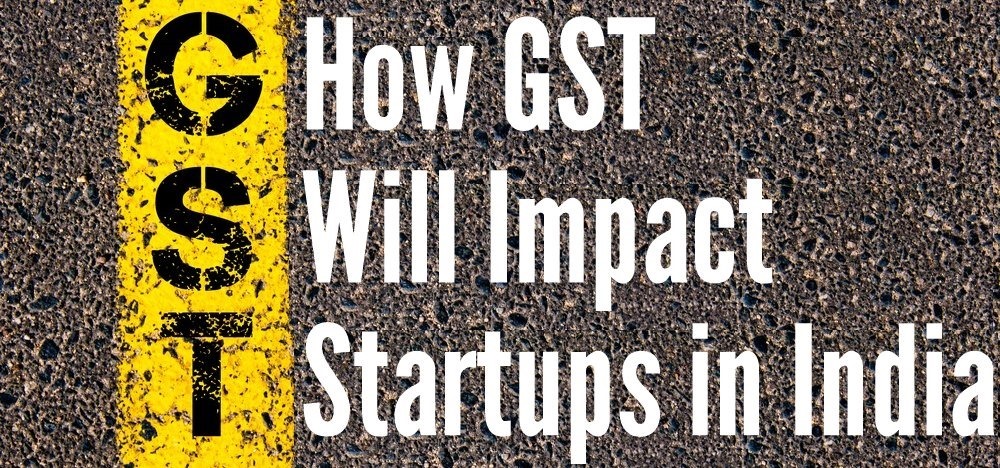How GST Will Impact Startups in India

The long awaited constitutional amendment to Goods and Services Tax (GST) finally sees the light of the day. Given that the businesses in our country face several hurdles in dealing with 29 states, 7 union territories and of course the central government, the uniform tax structure is definitely something to cheer about. GST is deemed to benefit the businesses of all sizes and nature, startups too can expect to look forward to better times ahead.
Currently, India is home to 4200 startups and the third largest startup ecosystem in the world, registering a growth of 40% year-on-year. GST will further boost the positive sentiment around the startup industry in India in many ways.
Contents
Simpler taxation
Adhering to different taxation regulations in different states makes the taxation process more complex and burdensome. GST will simplify it by integrating all indirect taxes, making one single tax to be paid by everyone. The tax calculations will be easier, thereby saving time and energy for the startup entrepreneurs to focus on the core competencies of their business instead of tax paperwork.
Simpler registration, easy to scale up
VAT registration from the sales tax department is imperative to start a new business. But, a business operating in multiple states has to follow various procedures and pay different types of fees in each state.
GST will bring uniformity, simplification and a centralized registration for companies. With GST, entrepreneurs need to get a just single license, and they are all set to do business in multiple states, as long as they pay the taxes. This will pave way for startups to launch, expand or scale their business smoothly.
Higher exemption from taxes
As per the current taxation laws in most states, VAT is applied uniformly to businesses with a turnover higher than INR 5 lakh. To lower the tax rates, businesses with a revenue of INR 10 lakh to INR 50 lakh can opt for the VAT Composition Scheme. But this scheme has various terms & conditions attached to it, and is not suitable for every business. However, with the implementation of GST, businesses with revenue less than INR 10 lakh will be exempted from GST; and businesses with turnover INR 10 lakh up to INR 50 lakh will be taxed at lower rates.
This will not only reduce the tax burdens for startups, but also help them to invest the money saved on taxes, back in the business.
Improvement in logistics efficiency
The seamless movement of goods and a common market across the nation will result in greater efficiencies in logistics, which is currently a major pain point for startups for two reasons. One, state border checks delay the movement of goods transport vehicles, resulting in delayed deliveries and enhanced product cost to the end-customer.
Second, since the large companies have well-defined infrastructure and logistic facilities in place, they tend to stock – transfer their goods to other states and manage to avoid paying taxes on interstate commercial transport. On the contrary, startups neither have logistics nor funds to stock-transfer. So, they procure goods through interstate sales, on which they are liable to pay central sales tax.
GST will eliminate such inefficiencies, making interstate movement of goods cheaper and less time consuming. As there will be an uninterrupted movement in supply chain, the costs associated with maintaining high stocks will also be reduced.
According to CRISIL analysis, GST can reduce the logistics cost for the companies producing non-bulk goods by as much as 20%. This includes all goods besides the primary bulk commodities transported by railways – iron ore, coal, steel, cement, fertilizers, food grains, etc.
BUT….GST is not flawless…..There’s also a piece of bad news for startups
GST can potentially build up an extra burden on startups in the manufacturing sector or with a lesser turnover. According to the existing excise laws, a manufacturing business with a turnover less than INR 1.50 crore is exempted from paying any duty. After GST comes into force, this turnover limit could be reduced to INR 25 lakh, which may kill several startups.
The e-commerce startups will bear the brunt as well. The TCS (Tax Collection at Source) guidelines of GST state that e-commerce companies will have to file quarterly as well as monthly returns and collect the taxes from sales made on the portal. This will increase documentation and administration cost, the burden of which will eventually pass on to customers in the form of higher prices of the products.
Food prices may spike initially after GST implementation, resulting in inflation. There is also a lack of clarity as to whether mandi tax is included or not in GST. Such discrepancies will affect food startups.
The GST is also yet to specify what would be the GST rate. The clear picture will emerge only after that.
But, in spite of its current drawbacks, GST is the most friendly tax reform ever in the India. It seeks to bring transparency, simplicity and efficiency in the way businesses operate and government levies taxes. Startups should hope for bright, clear skies as far as GST is concerned.
[About the Author: The article has been contributed by Vikram Upadhyaya – Chief Mentor at GHV Accelerator.]

Standard Rate in GST Should be low so as to encourage more Start ups